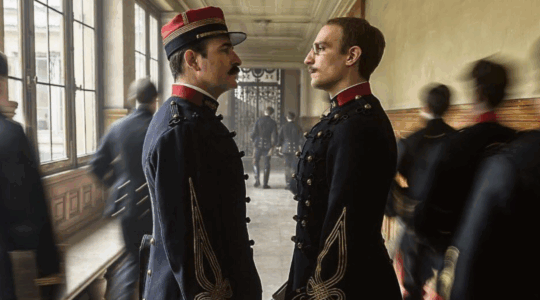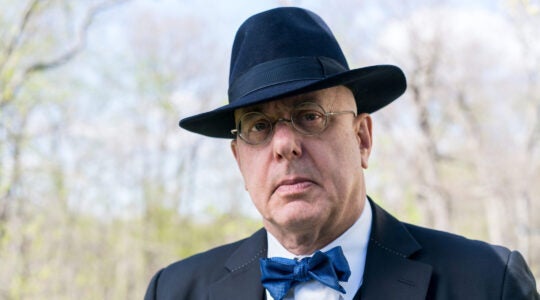Nora Ephron says that when she was young and would come to her screenwriter mother with her problems, the response would be, “Everything’s copy — someday this will be funny.”
In a conversation with journalist Abigail Pogrebin last Wednesday evening at the JCC in Manhattan that ranged from hilarious to poignant, Ephron observed that her mother’s attitude was “counter-intuitive to what a parent with a heart feels.” But it provided her with “unbelievable survival” skills, she added.
A screenwriter herself (and married to one), as well as director, playwright, novelist and former journalist, Ephron is known for her wit in writing and directing such popular romantic comedies as “Sleepless in Seattle” and “You’ve Got Mail.” But she was surprisingly personal and revealing at times during the hour-long, one-on-one interview with Pogrebin, who managed to present probing questions in a non-threatening way.
Ephron acknowledged, for instance, that accepting the job of directing a movie in the late 1980s, when her sons were 11 and 10, was not ideal for parenting. “It would have been better for them if I hadn’t done the movie,” she said. “I can’t pretend it’s better for your kids to go off to Toronto for eight weeks. You have to decide for yourself.”
And she admitted that she has been “more careless than I should be” in writing about loved ones. “The horrible truth is you hurt people, and there are some things I really regret.”
She did not offer examples. One of her novels, “Heartburn,” is a thinly veiled description of the affair that her second husband, Watergate journalist Carl Bernstein, had while Ephron was pregnant, which ended the marriage.
Ephron is promoting her popular new book, “I Remember Nothing,” cataloguing in short, humorous essays the indignities of “getting older” — she is 69, and believes that “really old is 80” — from not knowing the person who has just greeted you warmly at a party, to covering up the slight bald spot at the back of your head, to completely forgetting significant events from the past.
She said she was shocked to discover, while recently reading Lady Antonia Fraser’s memoir of her affair with and marriage to playwright Harold Pinter, that the couple had dined at Ephron’s house. “It’s on page 160,” she said, bemused that she had no recollection of the evening.
Ephron was generous in describing how, as a fledgling reporter at the New York Post in the early 1960s, she was helped enormously by patient editors who taught her how to craft a story, with a beginning, middle and end, and how gifted comic actors like Billy Crystal and Meg Ryan can take a movie script and make it “pop” with laughs through their ideas, props and acting skills.
“It’s the actors who make comedy, comedy,” she said, adding that in her family the worst thing you can say about someone is “NF,” as in Not Funny.
It was Crystal and Ryan, she said, whose contributions to Ephron’s script for “When Harry Met Sally” led to one of the more memorable scenes in film comedy history — Ryan proving to Crystal, in a crowded restaurant, that women fake orgasms. (Ryan suggested the scene be in a public place, Crystal came up with the closing line — and director Rob Reiner chose his mother to say it — “I’ll have what she’s having.”)
Ephron is one of four talented daughters of Henry and Phoebe Ephron, transplanted New Yorkers who raised their family in Beverly Hills and who, she says, became alcoholics later in life. (Phoebe Ephron died of alcoholism at the age of 57.)
“To get attention” at home growing up, “be funny,” Ephron recalled.
One sister, Hallie, is a journalist and novelist, and sisters Delia and Amy are screenwriters.
Nora and Delia, who is three years younger, often write together, and currently have an Off-Broadway play, “Love, Loss and What I Wore,” that is also being staged in Paris and Sydney, Australia.
Ephron said she loves working with Delia. “She’s a great writer, really funny, and we have a delicious rhythm together. We usually talk about what’s for lunch. And then, what’s for lunch tomorrow.”
Though she alluded to ongoing family squabbles, she noted that “siblings are one of the greatest things parents can do for you.”
Ephron said she doesn’t like being called a “woman director,” believing it marginalizes her work. And when Pogrebin asked how she responds to being called a “Jewish director,” Ephron shot back, “No one calls me that but you.”
She said she was raised in a completely secular home by her Jewish parents, but remarked that “what my mother taught me” about dealing with adversity by using it at some point in her work “was a fundamental Jewish life lesson.”
Ephron attributed to her mother the line: “A successful parent is one whose child grows up and is able to afford her own psychoanalysis.”
After the program, my wife and I bought a copy of Ephron’s latest book and joined the long line to have her sign it. When it was our turn, and we introduced ourselves, I told Ephron that I had met and interviewed her in Baltimore about 20 years ago. She gave me that pleasant, empty smile she’d described earlier.
“I don’t expect you’d remember,” I told her. “It was just you, me … and Harold Pinter.”
She laughed.
More from Gary Rosenblatt:
Earlier Between the Lines weekly columns
Blog
The New York Jewish Week brings you the stories behind the headlines, keeping you connected to Jewish life in New York. Help sustain the reporting you trust by donating today.





